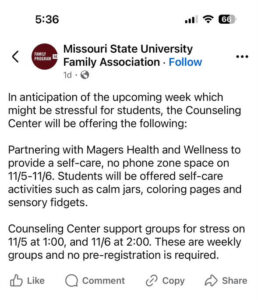In a since-deleted social media post, the Missouri State University Family Association this week offered students post-election counseling that includes “self-care activities such as calm jars, coloring pages and sensory fidgets.”
All “in anticipation of the upcoming week which might be stressful for students, the university’s Counseling Center announced drop-in counseling on Wednesday and Thursday, in partnership with Magers Health and Wellness Center, “the medical home for the Missouri State community.”
Everything, one supposes, that college students unable to cope with America’s system of self-governance might need.
The Facebook post, which appeared to have been made on Sunday, had been deleted by late Monday – though one follower of the Missouri State University Family Association page reproduced it under another association post.
“Why delete this charming snowflake post?” the commenter asked the association sardonically.

“Wow. Sounds like kindergarten,” another observer noted.
“College-age students should be offended that they’re being treated like preschoolers, and the college community should be embarrassed that they’re inclined to treat their students like preschoolers,” Dr. Frederick M. Hess, senior fellow and director of education policy studies at the American Enterprise Institute, tells The Heartlander.
“It’s impossible to take seriously, as bastions of thought or moral leadership, any college that treats its own students like fragile 4-year-olds.”
Another AEI senior fellow, Robert Pondiscio, posted on X of his horror at all this.
“A colleague just shared an email from a major university’s public policy school, which is planning a ‘self-care suite’ for students the day after the election featuring Legos, coloring, and milk & cookies.
“Folks, this isn’t funny anymore. It’s disturbing to treat adults like fragile children.”
It’s not clear whether the offer of counseling stands after the post’s deletion.
The Heartlander asked Counseling Center Director Dr. Allicia D. Baum in an email whether any students or family members have already taken them up on the offer of counseling in the election’s aftermath, and if so what in particular they may be fearful or stressful about.
The Heartlander also asked what prompted the offer of counseling. Was it past student experience – distress among students during a previous election, perhaps? There was a lot of angst on the left, for instance, after the 2016 presidential election.
“The 2016 election was psychologically traumatic for some, according to a new study published in the Journal of American College Health,” CNN reported in 2018. “It found that 1 out of 4 students surveyed experienced clinically significant event-related distress short term.”
“Following a tragedy, universities often pacify student fears by hosting forums, self-care events and support groups,” USA Today reported right after the 2016 election. “Following the election of Donald J. Trump as president of the United States, many universities have followed that same formula.”
“I think students everywhere are really afraid and need inspiration from current stakeholders,” Larissa Szilagyi, founder of the Women’s Political Caucus at Pace University, told the news outlet at the time. “A lot of colleges are doing programming to help alleviate this anxiety — not because of their allegiance toward a conservative or liberal agenda, but because communities need to inhabit safe spaces. These programs help show students that we can overcome and we shall overcome oppression.”
But really – calm jars, coloring and sensory fidgets? Are the vagaries of self-governance really so traumatic? Would these students rather live in a dictatorship, where no such decisions are made by the people?
Is self-governance just too much for today’s young?
“Using taxpayer dollars to infantilize adults is a waste of public resources and creates a toxic environment that engenders victimhood rather than resilience,” says Carrie Sheffield, senior policy analyst at Independent Women’s Voice.
“As a survivor of severe childhood trauma due to physical and sexual family abuse, it is upsetting to me that true victims of trauma are diminished by diverting these resources for adults who should recognize the importance of our civic duty to respect electoral outcomes like adults rather than angst-ridden adolescents. It also encourages a focus on subjective emotions rather than substantive, fact-based policy conversations.
“Americans must unify, and these types of divisive antics breed further social mistrust rather than cohesion.
“I’m disappointed how things have evolved at this university in the decades since I attended Missouri State University for a political science course my senior year of high school in the fall of 2000 at Parkview High School in Springfield.”

